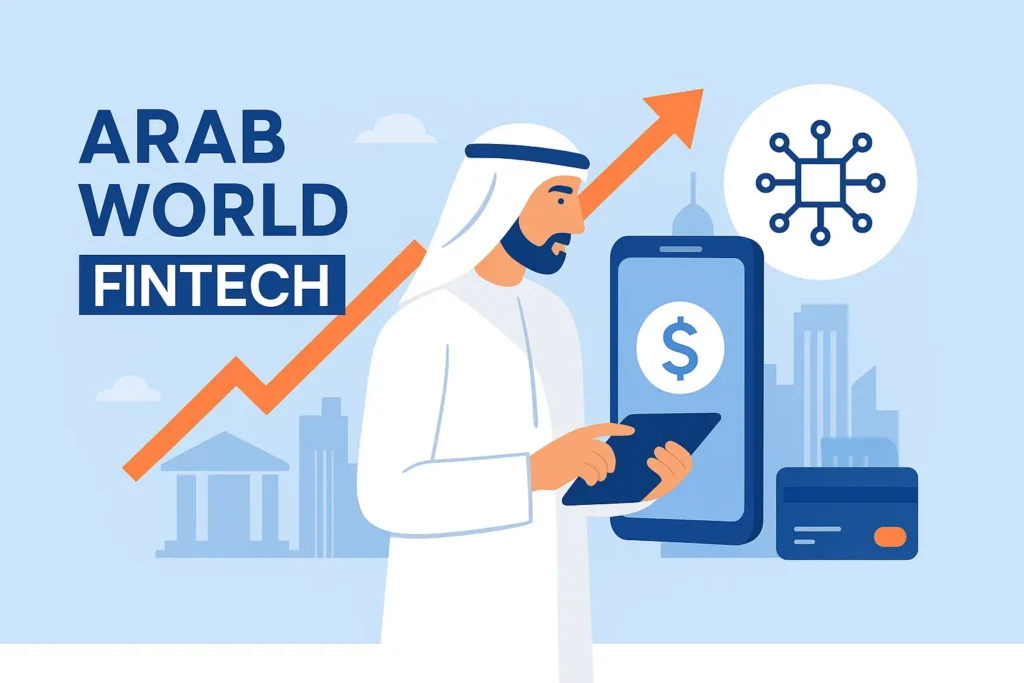The Rise of Fintech in the Arab World: Opportunities and Challenges
By: Anurag Tiwari
The Arab world is experiencing a financial revolution, where technology and finance are blending to reshape how people manage money. Fintech has become the engine driving digital payments, mobile banking, and innovative financial solutions across the region. Countries like Saudi Arabia, the UAE, Iran, Kuwait, Malaysia, and Indonesia are leading the charge, with the Global Islamic Fintech (GIFT) Report 2023/24 naming them as top players. Yet, while the sector is full of promise, it also faces significant challenges.
A Rapidly Expanding Market
Fintech in the Arab world is growing at an unprecedented pace. Hubs like the UAE, Saudi Arabia, Egypt, and Bahrain are seeing hundreds of startups emerging every year. These companies are not just focusing on digital wallets or mobile payments—they are exploring blockchain, peer-to-peer lending, crowdfunding, and wealth management.
Governments are playing a key role in this growth. Initiatives like Saudi Arabia’s Vision 2030 and the UAE’s digital economy strategies place digital banking at the center of national progress. Regulatory sandboxes in Bahrain, Abu Dhabi, and Riyadh provide startups a safe space to test solutions while keeping consumer protection in mind. This combination of state support and entrepreneurial energy is positioning the Arab world as a rising hub in the global fintech ecosystem.
Financial Inclusion: Unlocking Potential
One of the biggest opportunities in Arab fintech lies in financial inclusion. Millions in the region are still unbanked or underbanked, lacking access to traditional banking services. Mobile banking, micro-lending, and digital wallets are bridging this gap, making financial services accessible and affordable.
For instance, mobile payment adoption is rising sharply in Egypt, while Saudi Arabia is expanding digital banking licenses to offer more consumer choices. By providing access to financial tools, fintech is empowering entrepreneurship, supporting small businesses, and enabling more people to participate in the economy.
Innovation as a Growth Driver
Fintech is not just about inclusion—it’s a driver of economic innovation. Digital payments simplify commerce, blockchain enhances transparency, and AI-driven analytics improve credit assessments. Startups are collaborating with banks, insurers, and telecom companies to create hybrid solutions that balance trust and agility.
Global investors are taking notice. Venture capital into Arab fintech startups has grown steadily, bringing not only capital but expertise, mentorship, and international market access. This helps the ecosystem scale faster and strengthens confidence in the region’s fintech potential.
Challenges: Regulation, Trust, and Talent
Despite its growth, the sector faces hurdles. Regulatory frameworks vary widely across countries, which can slow cross-border expansion. While sandboxes help, harmonized regulations would make it easier for startups to scale across the region.
Consumer trust is another challenge. With more people using digital financial services, concerns about cybersecurity, fraud, and data privacy are rising. Strong consumer protections and robust cyber defenses are essential to build confidence and long-term adoption.
Talent shortage is also a pressing issue. Fintech requires expertise in finance, software development, data science, and cybersecurity. While educational programs and accelerators are emerging, demand still outpaces supply. Without investment in training and skill development, the sector may struggle to meet its growth potential.
Bridging Tradition and Innovation
The Arab financial sector has deep roots in traditional banking. For fintech to thrive, collaboration is key. Many established banks are partnering with startups, investing in digital platforms, and embracing open banking. Banks bring trust and regulatory experience, while startups bring agility and innovation.
Cultural considerations, such as Sharia-compliant financial products, also create unique opportunities. From digital sukuk issuance to interest-free peer-to-peer lending, Islamic fintech solutions are gaining attention both locally and globally.
Looking Ahead: A Balanced Approach
The fintech revolution in the Arab world is more than a trend—it’s a structural shift reshaping economies. Expanding financial inclusion, driving innovation, and attracting investment position the sector as a cornerstone of regional growth.
To reach its full potential, the region must harmonize regulations, strengthen cybersecurity, and cultivate talent. Entrepreneurs, investors, and policymakers who navigate these challenges successfully will define the future of finance in the Arab world.
Conclusion
The Arab world’s fintech journey is just beginning, but the path is promising. By blending innovation, inclusivity, and governance, the region can create financial systems that are efficient, accessible, and resilient. The Arab world is not merely following global trends—it is carving out a distinctive place in the future of global finance.



